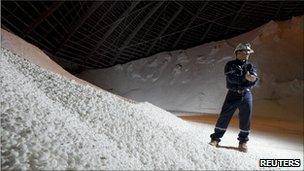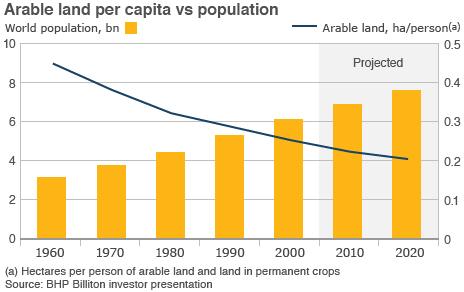Potash Corp urges rejection of BHP Billiton's bid
- Published

Potash Corp described itself as "a uniquely valuable asset"
The world's largest fertiliser producer, Potash Corporation, has urged its shareholders to reject a hostile takeover bid from BHP Billiton.
Mining giant BHP last week launched a $40bn (£25.8bn) hostile bid for Canada's Potash Corp after having had an initial offer rejected.
Potash reiterated that the bid was "wholly inadequate", as demand for its products is expected to rise.
It also said it had held talks with other potential bidders.
"There are a number of people who have contacted us... all sorts of different players. People would be surprised at what we're seeing," the group's chief executive Bill Doyle said.
Potash said it expected "superior offers" or other alternatives to emerge from these discussions.
Media reports have suggested that Chinese fertiliser firm Sinochem may be interested in bidding.
'Undervalued'
Demand for fertiliser is expected to increase in the next few years because of rising demand for meat in emerging markets, as more crops are needed to feed cattle.
"The Potash Corp board of directors is unanimous in its belief that the BHP Billiton offer substantially undervalues Potash Corp and fails to reflect both the value of our premier position in a strategically vital industry and our unparalleled future growth prospects," said Potash Corp chief executive Bill Doyle.
BHP has offered to buy Potash for $130 per share. Analysts have suggested that BHP, one of the world's biggest mining firms, will need to increase its offer to secure acceptance.
Potash described the offer as "highly opportunistic" and said it was unhappy that the offer was only 16% above its share price the day before BHP's offer was announced.
Since then, its shares have risen sharply and are now well above the offer price. The company takes this as a sign that the offer is for less than it is worth.
Its shares rose further after Monday's announcement, rising 1.2% to $151.52.
(Article continues below)
As the world population grows, existing arable land will need to become more productive if it is to meet increased demand.
As well as crops needed for food and drink products, more will also be required to feed cattle as demand for meat increases.
The UN's Food and Agriculture Organization says demand for meat products in developing countries is being pushed up by rising incomes, population growth and urbanisation, and has forecast global meat production to double by 2050.
The fertiliser industry is therefore expected to benefit, and BHP is keen to cash in.

- Published18 August 2010
- Published17 August 2010